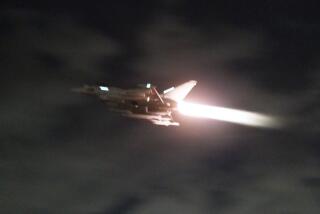Petraeus sees more violence if force shrinks
- Share via
WASHINGTON — The sectarian violence engulfing Iraq will only grow worse if the U.S. abandons its current military strategy and begins to withdraw its forces, the top American war commander said Thursday.
Army Gen. David H. Petraeus, speaking at a Pentagon news conference, said he was trying to steer clear of the “political minefields” of Washington and avoided any direct comment on the political showdown between Congress and the White House over Iraq.
But he said the limited improvements that had resulted from President Bush’s new strategy would be eroded by troop withdrawals. The Democratic measure would require withdrawals to begin by October, with a goal of completing the U.S. pullout in six months.
“My sense is that there would be an increase in sectarian violence, a resumption of sectarian violence, were the presence of our forces and Iraqi forces at that time to be reduced,” Petraeus said.
Bush summoned Petraeus to Washington this week to help the administration make its best case for keeping U.S. troops in Iraq.
As the Army’s leading counterinsurgency theorist, with a reputation for being politically adept but independent, Petraeus has emerged as a top advocate of Bush’s new strategy.
Petraeus also offered new details of Iranian involvement in Iraq, addressed U.S. efforts to counter the suicide bombings that have killed hundreds of Iraqis in recent months, and warned of the likelihood of additional American casualties.
Petraeus said he had agreed to provide Defense Secretary Robert M. Gates with an assessment of the new strategy in September along with a recommendation of how to improve American military operations.
“We will be forthright in that assessment,” he said.
A veteran of multiple tours in Iraq and Washington, Petraeus is a practiced speaker, weaving together specific details and sharply drawn images to argue his larger view.
In the wide-ranging news conference, he talked about the numbers of small shops that had opened since the new strategy began, dropped the names of tribal leaders now supporting American efforts, and spoke about flying over Baghdad and watching Iraqis engaged in ordinary activities, such as watering the grass.
Since the U.S. troop buildup began, the overall level of violence and death in Iraq has remained unchanged, Petraeus said, though there has been a two-thirds reduction since January in the number of sectarian murders.
Nonetheless, suicide car bombs have continued to kill hundreds, he said.
Having previously served in Iraq as the two-star division commander in Mosul, and as the three-star head of the Iraqi security force training effort, Petraeus said the current situation in Iraq was “the most complex and challenging I have ever seen.”
Still, he cautioned that the situation in Iraq was likely to get even more difficult.
Petraeus conceded that could mean more American deaths as U.S. forces moved into previously unpatrolled territory.
“There is a very real possibility that there’s going to be more combat action and that, therefore, there could be more casualties,” he said.
As of Thursday, 87 American troops had been killed in April, the largest monthly toll since December, when 112 were killed.
Petraeus said he was aware that the sensational car bomb attacks often “overshadow our daily accomplishments.”
“While the enemy’s effectiveness in carrying out such attacks has been reduced by our operations to some degree, there clearly are still far too many of them,” he said.
Comparing the violence in Iraq to Northern Ireland’s sectarian conflict, he said the Iraqis were an “exceedingly resilient people” who had learned to live with a measure of violence.
“Look, I think you have to be realistic and acknowledge there is going to be a continuation of some level of sensational attacks,” he said.
Stopping car bomb attacks is a military priority, Petraeus said. U.S. forces are erecting stronger barriers around markets and restricting vehicular traffic. They have also stepped up efforts to gather intelligence about insurgent cells that build and distribute the bombs.
“We obviously are focusing heavily on actions to identify and dismantle the networks that carry out car-bomb and suicide-vest attacks and their supporting infrastructure,” Petraeus said.
Petraeus said the car bomb attacks were mainly carried out by foreign fighters, most of whom made their way into Iraq through Syria.
Syria and Iran, Petraeus said, continue to exert a troubling influence and “compound the enormous problems facing the new Iraq.”
Like other Defense Department officials, Petraeus said there was no “direct link” from these fighters to upper levels of the Iranian government.
But he provided new details about links between Iran and militants in Iraq.
Petraeus said troops recently obtained a 22-page memo detailing plans for an operation that killed five U.S. soldiers in Karbala in January. The document showed that a militant cell with ties to Iran was responsible for the operation.
The document did not prove that Iranian officials conceived of or ordered the attack, Petraeus said. But he said there was no doubt the militant group responsible for the attack, known as the Khazaali network, had been funded and trained by Iran.
Two brothers, Qais and Laith Khazaali, were captured by U.S. forces and detained for their alleged role in the attack.
Petraeus indicated the group had ties to the international arm of the Iranian Revolutionary Guard, known as the Quds Force.
“There’s no question that the Khazaali network is directly connected to the Iranian Quds Force, received money, training, arms, ammunition, and at some points in time even advice and assistance and direction,” he said.
Johanna Neuman contributed to this report.
More to Read
Sign up for Essential California
The most important California stories and recommendations in your inbox every morning.
You may occasionally receive promotional content from the Los Angeles Times.










